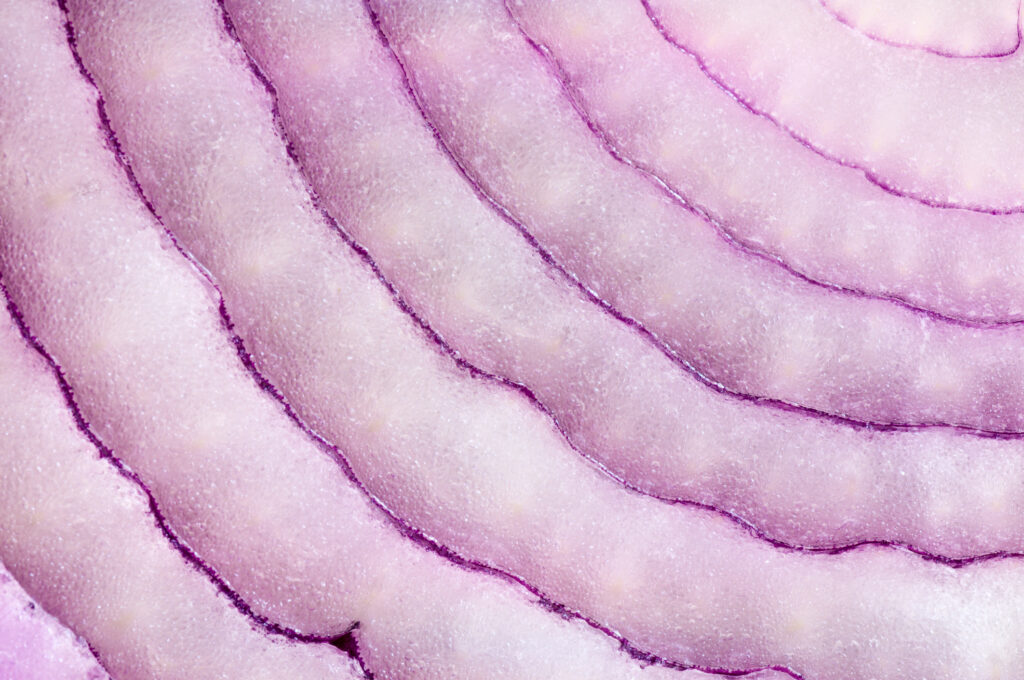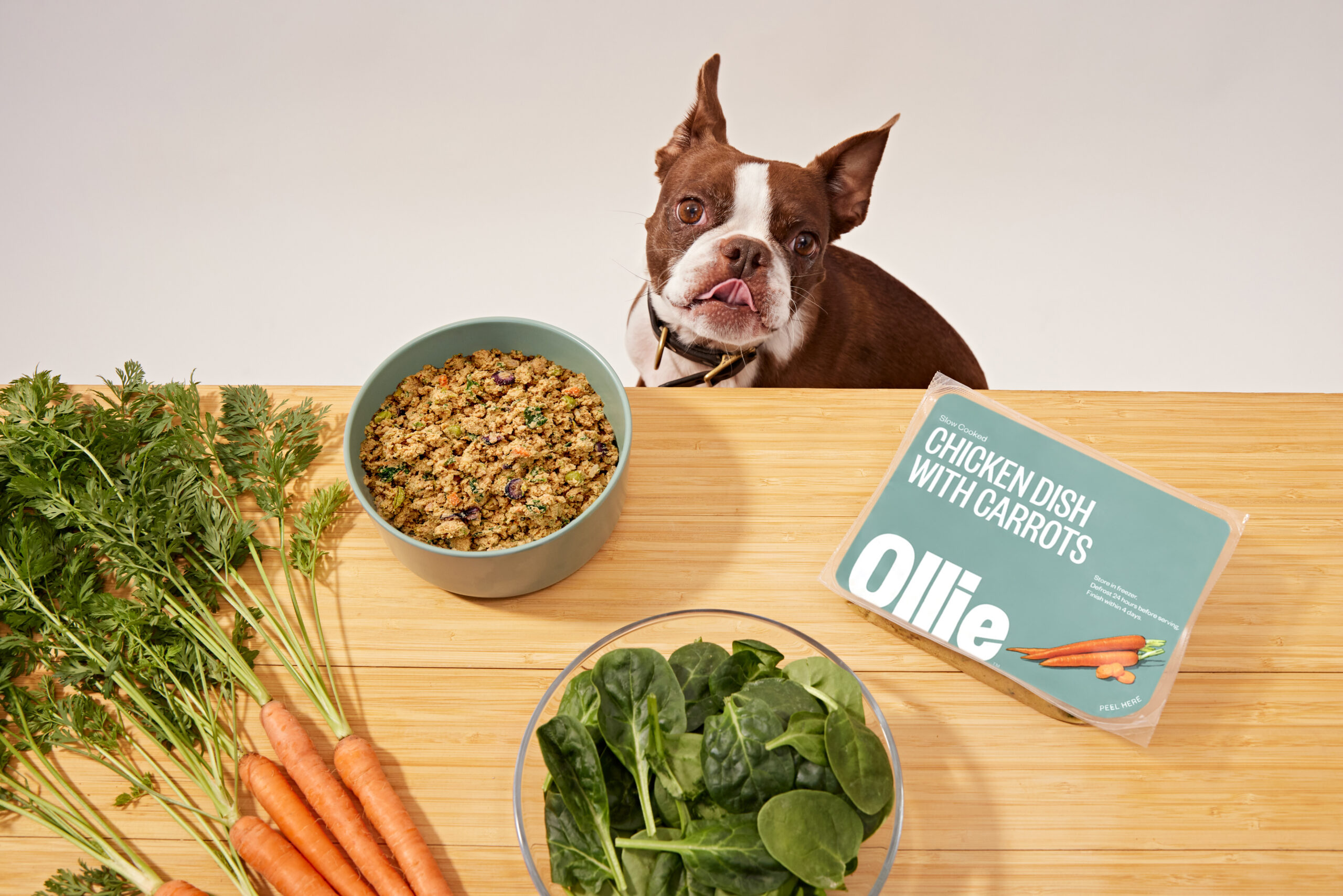Hey Ollie blog readers! We’re offering you an exclusive 60% OFF your starter box! Try now!
As a pup parent, you want to give your dog the best possible start in life, and that begins with proper nutrition. The early months of your puppy’s development are crucial, requiring specific nutrients to support their rapid growth, brain development, and immune system maturation. At Ollie, we understand the importance of these early nutritional decisions. Our fresh recipes provide growing puppies with the precise balance of nutrients they need to thrive.
The Critical Role of Nutrition in Puppy Development
Proper nutrition is critical to the health and development of puppies, regardless of breed, and it directly influences their immune system and body composition. [1] Your puppy’s lifelong health and happiness begins with you. Get it right from the start. [2]
Unlike adult dogs, puppies have unique nutritional requirements that change rapidly during their first year. Puppies have different nutritional requirements at various growth stages, and these needs can change within a matter of weeks. [3] Understanding these requirements helps you make informed decisions about your puppy’s diet from the very beginning.
Why Puppy-Specific Food Matters
A puppy’s nutritional needs are a lot different from an adult dog. They need to get enough nutrients to fuel their speedy growth. [4] Puppy food provides important nutrients that support growth and other important body functions for puppies. Adult dog food is not nutritionally balanced for puppies and could lead to deficiencies or other health concerns if eaten regularly. [5]
The importance of choosing the right food cannot be overstated. When you feed your puppy a diet specifically formulated for growth, you’re ensuring they receive adequate nutrition to support:
- Rapid skeletal development
- Brain and nervous system maturation
- Immune system strengthening
- Healthy organ formation

Essential Nutrient-Dense Ingredients for New Puppies
1. High-Quality Protein Sources
Protein serves as the building block for your puppy’s growing body. Proteins help build your puppy’s tissues. [4] For growing puppies, protein requirements are significantly higher than for adult dogs. Diets for growing puppies and reproduction should contain a minimum of 22.5% protein as dry matter or 56.3 grams per 1,000 kcal ME (AAFCO guidelines) [6]
Best protein sources for puppies include:
- Whole deboned chicken or turkey
- Fresh fish like salmon or sardines
- High-quality organ meats (liver, heart)
- Eggs
- Lamb
Newly weaned puppies (puppies who have recently stopped drinking their mother’s milk) require the most protein. As they age, their need for protein slowly decreases. [5] Ollie’s fresh recipes feature whole meat proteins as the primary ingredient, ensuring your puppy receives the amino acids necessary for proper development.
2. DHA and Omega-3 Fatty Acids
One of the most critical nutrients for your puppy’s development is DHA (docosahexaenoic acid). DHA (docosahexaenoic acid) is an omega-3 fatty acid important for neural development of puppies. DHA is a major structural component of the brain, as well as the most abundant fatty acid in the brain. [7]
A study published in the Journal of the American Veterinary Medical Association concluded that feeding newly weened puppies (between eight weeks and a year old) foods high in DHA resulted in better cognitive, memory, psychomotor, immunologic, and retinal functions than puppies that did not have DHA in their diets. [8]
Benefits of DHA for puppies:
- Enhanced brain development and cognitive function
- Improved retinal development and vision
- Better trainability and learning capacity
- Stronger immune system response
Rich sources of DHA include:
- Sardines, anchovies, salmon, mackerel, trout, and herring [9]
- Fish oils (specifically from cold-water fish)
- Marine algae supplements
It’s essential for lactating females to ingest omega-3s to pass on to their puppies through their milk. Omega-3s are important for the developing brains and retinas of young puppies.
3. Healthy Fats for Energy and Development
Fat is necessary for growing puppies because it’s high in calories, contains essential fatty acids, and acts as a carrier for vital vitamins. [5] Fats help keep their skin and hair healthy. They also help your puppy develop a healthy brain and healthy vision. [4]
Puppy diets usually contain 8%–20% fat (dry-matter basis). The wide range of fat content in different diets provides for the different energy requirements of a given animal, to accommodate the varying demands of work, stress, growth, or lactation as opposed to maintenance. [6]
4. Digestible Carbohydrates
Carbohydrates help give your puppy energy. [4] Until adulthood, carbohydrates should be included in the food at about 20% dry matter (when moisture is removed) to promote a pup’s metabolism and overall health. [5]
Excellent carbohydrate sources for puppies:
- Sweet potatoes
- Brown rice
- Oats
- Quinoa
- Lentils (in moderation)
5. Essential Vitamins and Minerals
Growing puppies require precise amounts of vitamins and minerals to support their development. Puppies require more calcium than adult dogs, because they require calcium for growth and development of their skeletons. Excessive calcium can also be a problem and can contribute to growth abnormalities. Calcium content in growth food formulations for large and giant breed puppies needs to be considered more carefully as these breeds have the highest risk for growth abnormalities. [1]
Key vitamins and minerals for puppies:
- Calcium and phosphorus (in proper ratios)
- Vitamin A for vision and immune function
- B-vitamins for energy metabolism
- Iron for healthy blood formation
- Zinc for skin and coat health
Understanding AAFCO Guidelines for Puppy Nutrition
When selecting food for your puppy, look for products that meet Association of American Feed Control Officials (AAFCO) standards. Food that follows Association of American Feed Control Officials (AAFCO) guidelines for the “growth” stage. Food that’s formulated specifically for puppies ensures their unique nutritional needs are met. Foods labeled for “All Life Stages” are also acceptable. [10]
Your puppy will get all the nutrients they need from puppy food with those labels. [4] At Ollie, all our recipes are formulated to meet AAFCO guidelines for all life stages, ensuring your puppy receives complete and balanced nutrition throughout their development.
Feeding Guidelines and Best Practices
Age-Appropriate Feeding Schedules
Like human babies, puppies start out needing many small meals a day, made from a food that’s been formulated for their special nutritional requirements. [2] The frequency of feeding depends on your puppy’s age:
- 8-12 weeks: 4 meals per day
- 3-6 months: 3 meals per day
- 6+ months: 2 meals per day
Portion Control and Growth Monitoring
There’s a saying among dog people: Watch the dog, not the dish. Body condition, not the amount of food your puppy has eaten or left in the bowl, should determine your puppy’s portion sizes. Portion sizes depend on individual metabolism and body type, and nutritional requirements vary from dog to dog. [2]
The 10% Rule for Treats
Treats should contribute no more than 10% of your puppy’s daily caloric intake. Ensure you include these calories when you calculate your furry pal’s daily nutrition requirements. [3] It is important to remember that calories not only come from your puppy’s food, but also from any treats or snacks they eat. In order to ensure your puppy’s overall diet is complete and balanced and to control your puppy’s calorie intake, no more than 10% of their total daily calories should come from treats or snacks. [1]

What to Avoid in Your Puppy’s Diet
Harmful Ingredients and Foods
Several ingredients and human foods can be dangerous for your puppy:
- Grapes and raisins, are toxic to dogs and can even cause kidney failure [10]
- Chocolate (contains theobromine)
- Onions and garlic
- Xylitol (artificial sweetener)
- Foods high in salt and fat
Foods That May Cause Digestive Issues
Some foods may not be toxic but can be difficult for puppies to digest, like milk and raw asparagus. [10] Always introduce new foods gradually and monitor your puppy for any adverse reactions.
Signs Your Puppy Is Thriving on Their Diet
When your puppy receives proper nutrition from nutrient-dense ingredients, you’ll notice several positive indicators:
Physical Health Markers
- Shiny, soft, healthy coats are a sign of good nutrition [10]
- Stools should be solid, brown, and well-formed [10]
- Steady, controlled weight gain
- Bright, clear eyes
- Good energy levels and playfulness
Behavioral Benefits
Proper nutrition, particularly adequate DHA intake, can lead to improved trainability and better behavior. Pet parents who feed their puppies a diet high in DHA have even noticed behavioral benefits. Their pups seem easier to train and get along with other furry companions and humans more readily. [8]
Making the Transition to Solid Food
Weaning Process
Once they reach 4 weeks, your puppy’s baby teeth will appear, making them ready for the weaning process—the slow transition from mother’s milk to puppy food. [11] To help get your little pal used to solid food, veterinarians recommend wetting the puppy food with enough warm water to make a soupy gruel. [4]
The weaning process should be gradual, typically taking 3-4 weeks to complete. By 7-8 weeks of age, most puppies should be fully transitioned to solid food.

Why Choose Ollie for Your Puppy’s Nutrition
At Ollie, we understand that raising a thriving pup starts with the right nutrition. Our fresh, human-grade recipes are specifically designed to meet the unique needs of growing puppies. Here’s what makes Ollie the ideal choice for your new puppy:
Expert Formulation
Our recipes are developed with veterinary nutritionists and meet AAFCO guidelines for all life stages. We use only the highest quality, human-grade ingredients without fillers, by-products, or artificial preservatives.
Personalized Nutrition
We create customized meal plans based on your puppy’s age, breed, weight, and activity level, ensuring they receive the precise nutrition they need at every stage of development.
Convenient Delivery
Fresh meals are delivered directly to your door on a schedule that works for you, making it easy to provide consistent, high-quality nutrition for your growing puppy.
Frequently Asked Questions
When should I switch my puppy to adult dog food?
It’s best to feed puppy food until your dog has reached at least 80% of their adult size. Small breeds (under 25 pounds at adulthood), usually reach this size around 10–12 months. Medium breeds (25–50 pounds at adulthood), get there around 12–15 months. Large breeds (50 pounds and up at adulthood) typically reach this size between 15–24 months. [5]
How much protein does my puppy need?
Newly weaned puppies require the most protein. Protein in a dog’s milk is high, readily available, and digestible. Therefore, younger puppies that have just been weaned have the greatest need for protein. Fat is also important at this stage because it supports a puppy’s rapidly developing nervous system. When puppies reach 3 months old, their protein and fat requirements begin to decline (though they’re still greater than the amounts required in adulthood). [5]
Can I give my puppy supplements?
Most puppies receiving a complete and balanced diet don’t need supplements. However, always consult with your veterinarian before adding any supplements to your puppy’s diet, as excess nutrients can be harmful.
What should I do if my puppy won’t eat their food?
If your puppy occasionally skips a meal or picks at food, don’t worry. It could mean they are ready to eliminate a feeding or that you have given them too much, in which case you can simply reduce the quantity served at future meals. [2] If the behavior persists, consult your veterinarian
.
How do I know if my puppy is getting enough DHA?
Look for foods that specifically mention DHA content or fish oil as an ingredient. Current recommendations suggest choosing supplements that provide approximately 25 mg/kg body weight of DHA and 40 mg/kg body weight of EPA per day. [9]
Raising a thriving puppy begins with understanding their unique nutritional needs and providing nutrient-dense ingredients that support their rapid development. By choosing high-quality protein sources, ensuring adequate DHA intake, and providing balanced nutrition through every stage of growth, you’re setting the foundation for your puppy’s lifelong health and happiness.
Ready to give your puppy the nutrition they deserve? Explore Ollie’s fresh recipes and discover how easy it can be to provide your growing puppy with the nutrient-dense ingredients they need to thrive.
Citations
[1] https://vcahospitals.com/know-your-pet/feeding-growing-puppies
[2] https://www.akc.org/expert-advice/nutrition/puppy-feeding-fundamentals/
[3] https://canebayvetclinic.com/7-puppy-nutrition-tips/
[4] https://www.webmd.com/pets/dogs/feeding-puppy
[5] https://www.petmd.com/dog/nutrition/how-much-to-feed-puppy
[7] https://www.purina.ca/articles/dog/nutrition/benefits-omega-3-and-omega-6-dogs
[8] https://todaysveterinarypractice.com/nutrition/fish-oil-dosing-in-pet-diets-and-supplements/
[9] https://www.dogster.com/dog-nutrition/sources-of-omega-3-for-dogs
[10] https://www.rover.com/blog/puppy-nutrition-basics/
[11] https://headsupfortails.com/blogs/all/complete-guide-on-puppy-feeding
Tagged As:

The nutrition your dog needs,
the food they want.

Enjoying our articles? Subscribe our Newsletters and get new articles directly to your inbox
You might also like
29 October 2025
5 MINS READ
Choosing the Best Natural Puppy Food: Top Picks for Growing Pups
Bringing home a new puppy is an exciting time, and as a pup parent, you want to give your dog the absolute best start. Since proper nutrition lays the foundation for their growth, development, and…
by Ollie Pets
29 October 2025
4 MINS READ
How Ollie’s Human‑Grade Meals Help Soothe Sensitive Stomachs
Whether it’s dealing with gas, loose stools, or vomiting, as a pup parent, you want to find a solution that brings relief to your dog’s sensitive stomach. Often, the key to managing these digest…
by Ollie Pets
17 October 2025
6 MINS READ
Choosing the Best Food to Fuel Your Puppy’s Strong Future
As a new pup parent, you have the responsibility of laying the foundation for your puppy’s future health. The nutritional choices you make during their first year are crucial, directly influenci…
by Ollie Pets







